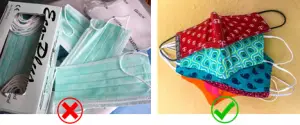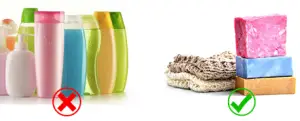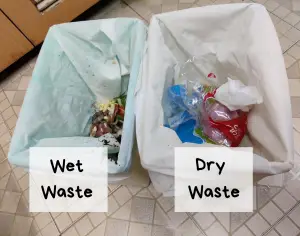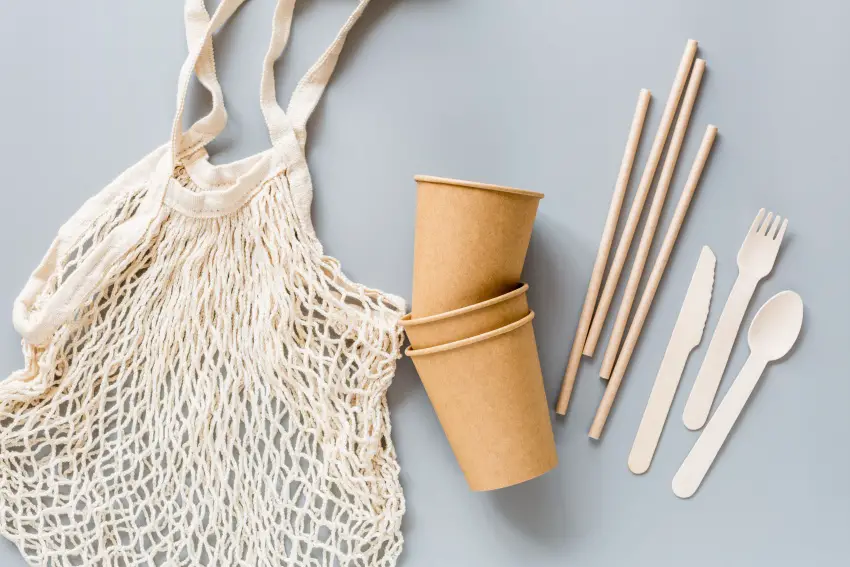Living in the era of a pandemic, when personal hygiene and reducing exposure to germs has become more important than ever – our tendency to discard products in a jiffy has increased dramatically over the past few months. Plastic pollution is expected to grow by 40% in the next 10 years (as per a report last year from the WWF), so it’s not difficult to see why environmentalists around the world are sounding the alarm over single-use products. As we gear up to face the pandemic for an unprecedented time, we must be mindful and reduce waste in our daily life to avoid stepping into another crisis altogether. Infact, the current slowdown is a great opportunity for us to make small but lasting changes towards a low-waste lifestyle. Based on my own experience and the advice of experts, here are 15 easy tips & examples to reduce waste in your daily life:
#1 Use reusable cloth masks instead of surgical masks
This is a new entrant into an already competitive space of single-use plastics. The surgical masks are made of non-biodegradable material and can be used only once. These masks are ideal for doctors and those who are in direct contact with an infected person. But somehow, the rest of the world has also embraced these single use masks to avoid the hassle of purchasing & washing a reusable mask.
It has just been 4 months and the discarded masks have started choking the oceans. These masks not only are a threat to our environment but also pose a health hazard if not disposed properly.

The best way to curb this menace is to use reusable multi-layered cloth masks which are not just safe but are a lot more breathable and easier to use. All thanks to capitalism, we have multiple brands competing in this category, so there is no dearth of a variety of stylish reusable masks available. So, ditch those surgical masks NOW!
Reduce waste examples: Here are some links you can use to purchase some great cloth masks:
#2 Use your own mugs and boxes for restaurant take-aways
Carrying your own cups might sound like an inconvenient thing to do at first, but trust me it’s all just a matter of habit. If you do not have plans to recycle those coffee mugs from Starbucks, then you better carry your own washable mug from home to get that coffee. Turn your good intentions into a habit and start opting for reusable containers & cutlery for dine-outs & take-aways.
Reduce waste examples: Here are some links to help you get started with reusable containers:
#3 Always carry a sturdy cloth bag for shopping
If you haven’t made the switch or even considered the idea of reusable shopping bags, it’s time to have a change of mind. No matter whether you use plastic or paper bags for shopping, most of these are single-use items that would end up in the trash and would not be recycled any further. Reusable bags on the other hand are more durable and the best alternative to plastic bags.
Always carry a bag when you step out for shopping. You never know when you might need one and you will feel like a better human being saying no to those dreadful plastic bags! I would highly recommend choosing a bag with compartments so you need not worry about segregating the items that you shopped.
Reduce waste examples: Here are some links from where you can purchase great cloth bags for the next time you go out shopping:
#4 Plan you water consumption & avoid single-use plastic bottles
Another very basic and often neglected tip is to carry your own water bottle. Make it a habit. Plan your water needs (roughly) before stepping out and always ensure that you carry at least a small water bottle which can be refilled at your office, restaurant or the mall. Learn to say No to people who handout tiny plastic water bottles in stores/shops. Change begins with you.
Reduce waste examples: Here are some water bottles you can purchase for personal use and reduce your plastic usage:
#5 Opt for solid toiletries – soap bars and shampoo bars
Though one wrapper of soap or one bottle of shampoo might not seem to matter, it can definitely make a difference when multiplied by over a billion people, who live in India. Opt for soaps from brands with plastic free packaging- Dove for example, doesn’t wrap its soap in an additional layer of plastic and the packaging is completely plastic free. There are many other local & homegrown brands (like Bare Necessities, Earth Rhythm, Raw beauty) which do not use plastic packaging at all for their soaps & shampoo bars. By supporting these brands, you are not only reducing plastic waste but also encouraging a small conscious business to flourish.

Reduce waste examples: These are some of my favorite brands, go ahead and give them a try:
#6 Eliminate/ reduce usage of paper towels in public washrooms
I often come across people mindlessly using paper towels (just because they’re free) in public washrooms, which annoys the hell out of me. I mean why on Earth does anyone need 4-5 paper towels to dry their tiny hands? If you happen to be a hygiene freak try & carry your own cloth towel in your purse/pocket or use the air dryer to reduce wastage. In more dire situations – be more conscious and use only one paper towel.
#7 Try DIY home beauty solutions
Instead of mindlessly buying beauty products for everything, try googling some DIY home remedies for your hair or skin issues. Do a little research and experimenting, and you’ll find a solution that works for you. Making your own beauty solutions means buying less plastic, plus, using fresh natural ingredients is always better than using chemical loaded products.
#8 Avoid buying synthetic fibers – Polyester & Crepe
Synthetic clothing or fabrics break down each time you wash it and small pieces of plastic make it to our waterways. Always opt for clothing made of natural fibers like Linen & Cotton which are more breathable and comfortable. Natural fiber clothing may be more expensive up front, but I’ve found that it’s a better investment as they last longer and do not get fuzzy like their synthetic counterparts.
#9 Say NO to disposable straws
 Picture Source: NYTimes
Picture Source: NYTimes
You don’t need them- they are just a waste of resources, which end up polluting the oceans. If you love sipping that coconut water on the beach, opt for re-usable metal or bamboo straws which are easy to carry in your purse/ bag. It’s a good investment, trust me.
Reduce waste examples: Give these metal straws a try:
#10 Waste segregation- To reduce Methane emissions
I’ve recently understood the importance of waste segregation and how segregation at source improves collection efficiency and leads to better processing of waste. Inefficiencies in waste management are very common and when the waste is all mixed up in the landfills, the organic waste decomposes to release harmful Methane gas – that fuels climate change. So, a simple act of segregating Wet waste (organic kitchen waste) & Dry waste at source can bring efficiencies and reduce garbage off the landfills.

Reduce waste examples: Get yourself a waste-segregation trash can today:
#11 Use of Eco-friendly menstrual products
Majority of sanitary pads are made up of synthetic fibers which are not only non-biodegradable but release harmful chemicals that impact the health of intimate areas. I have personally switched to pads which are made of natural fibers and are more Eco-friendly and good for my health. However, these pads are slightly expensive compared to the synthetic ones.
A zero-waste and most economical alternative is a Menstrual cup which can be re-used for over 10 years and I’m definitely going to give it a try very soon.
Reduce waste examples: Here are a few brands you can try as well:
#12 Cut the cutlery in home delivery
Most food delivery apps nowadays give an option to refuse cutlery for the order. Even if they don’t, you can call the restaurant after placing your order and ask for a plastic-free delivery (if possible) or simply command them to not send any extra piece of cutlery AT ALL.
#13 Refusing printed customer copy for digital transactions
Straightforward and easiest to follow out of the entire list. The point here is to call-out and say NO before the vendor prints out and hands the piece of paper to you. As a conscious citizen, you can make it a habit to call out every time you swipe your card and make your digital transaction paper-less (or at least less paper if one less copy is printed).
#14 Support businesses that put efforts in sustainability
I love supporting local home-grown businesses especially if they do not shirk their responsibility towards the planet. When a company or a small business is taking steps to reduce their carbon footprint – appreciate them for it. Support them by buying their products and tell your friends about them.
#15 Give feedback and demand sustainable solutions
We consumers have immense power to demand solutions that matter the most to us. With businesses becoming more customer centric, we can drive a change by demanding for sustainable solutions- be it sustainable packaging, sustainable sourcing of ingredients or longevity of products. Email them, give feedback or suggestions- businesses will only innovate around sustainability when consumers ask for it.
You may choose to follow a few or all of the above tips in your daily life, but ultimately what matters is being conscious towards your plastic-footprint and assessing how your daily-life decisions impact the environment and taking actions accordingly.
Are you excited about reducing your plastic footprint? Which of these tips did you find most useful? Let me know in the comments. 🙂
Also check out my post- 6 Easy ways to add Superfoods to your daily diet


Great tips! These are some of my favorite things to do to be more sustainable.
I do most of these, but I definitely want to try introduce waste segredation!
Oh boy, the additional garbage face masks have caused. I definitely agree about investing in reusable ones. We just have to be careful to use proper filters and keep other measures in place. Thanks for this article and all the suggestions!
Best Salicylic Acid Toner
Great suggestions for lessening waste!
Is Lancome Cruelty Free? – Natural Beauty Uncovered
Great tips
Amazing tips
I love this post! There are so many reasons to reduce our waste and these are simple ways to make a big difference. Thank you for this!
Wow I did not know that polyester left pieces of plastic behind. I despise polyester and this is another reason to boycott it! BTW, the menstrual cup is the best thing to ever happen for women since the dawn of time.
Great tips!
Great suggestions! I just received the reusable paper towels I ordered, as it bothers me how horrible regular paper towels are for the environment.
Great suggestions! I’ve felt especially wasteful after starting my family and going through so many diapers. These are wonderful tips, thanks!
Fantastic tips, composting has been one of my favourite.
Thanks for sharing..
I love these tips! I’ve been using re-usable straws and masks, which are so simple but if everyone did it, it would help so much! x
– Charlotte / charlottesspace.com
These are such great tips! I am already implementing some of them, but now I have learned I can do much more!
I’m so lucky to live amongst people who view reusable bottle as normal and in a country where restaurants don’t often use plastic, but actual stone plates etcetera. Great tips, very inspiring!
Great one , really like it
All option are a good substitute or replacements Thanks good information , keep doing good work skin care products and remedies
These are great tips, most of which I already do in my life. Sadly I can’t agree with point 14 as transaction records are still important for business, tax reviews, proof of Payment etc. However, this list is really great and easy to implement
I do so many of these things already, but I moved away from it once COVID-19 settled in. It’s time to really buckle down and start working to save the planet again.
Wow, great tips and information! I’m definitely going to implement some of these ideas. Thanks for sharing!
Great tips! I try to reduce waste in my everyday life, but it’s not always easy. In South Africa, we don’t have shampoo and conditioner in bar form, which is annoying as I would love to use it like that. I do use my own cloth shopping bags and don’t use straws in general. Every little bit helps.
All the best, Michelle (michellesclutterbox.com)
Thank you for these great tips. Sadly, we can’t bring our own cups to the restaurants here. I haven’t seen the option to not include cutlery when ordering takeout, so I’ll keep an eye out and suggest that. Thats a really good one!
We make nearly all of our soaps, shampoo bars, laundry soap, cleaners, etc. I’m with you on dumping the liquids. We just switched to a bar of soap instead of liquid for washing dishes.
Number 10 was new to me, and I look forward to implementing it.
Thank you so much for reading!!